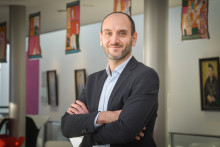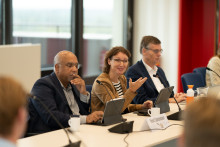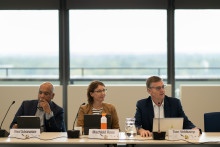Across Europe, and certainly here in the Netherlands, universities are facing significant financial pressure, leading to reorganisations that can feel unsettling and personal. Seeing these events unfold at institutions like my own, the University of Twente, has prompted me to reflect on how we, as academics, can remain centred. I've found myself returning to a set of principles that have helped me navigate these situations in the past. I’m sharing them not as a judgment on how others react, but simply as a tool that has worked for me. This is a perspective on personal resilience, not a substitute for the important work of advocating for fair policies and transparent institutional governance.
It starts with a feeling I know well because I have lived it: the sharp, personal sting of being passed over for a promotion I felt I deserved, or the bitterness after pouring months into a grant proposal you believe is brilliant, only to see it rejected while others you find less credible are accepted. It’s the belief that because we’ve worked hard, achieved success, and show great promise, we are entitled to a specific outcome. I've come to see this as the meritocracy trap, a subtle mirage that can lead to deep unhappiness.
One of the first mistakes I believe we make is treating organisations like people. I have poured my heart into my work and, in return, expected the institution to act like a loyal friend. But an organisation is not a person. It is a system designed for a purpose, and it makes strategic, not personal, decisions. While these choices are implemented by people within its hierarchy, they serve the organisation's goals, not personal relationships. Expecting the organisation to love you back is a path to disappointment I have walked myself.
This trap is especially potent within academia, where the nature of our work is uniquely empowering. As professors, we direct our own units and choose our own research, making it easy to feel powerful in our 'realm'. I know the feeling of success, of being recognised with awards, and the profound reward of nurturing others' growth. In such an environment, I found it incredibly easy to believe I was entitled to a commensurate level of respect from my organisation and control over my own future.
But I've come to realise this is a sort of hallucination. Outside of our specific realm, we are employees and citizens. This is the primary reality. Our ability to do our work depends entirely on this real environment, not vice versa. This sense of entitlement can blind us to a truth I have had to remind myself of often: we likely owe our organisations and society far more than they owe us. We focus on our individual contributions while ignoring the immense, invisible platform beneath our feet—the institutions that trained us, the legal systems that protect us, the infrastructure that supports us.
This is where I found the wisdom of Stoicism to be a practical antidote, focusing on a simple question: what is in my control and what is not? I cannot control a dean's final decision or a university's funding priorities. To fixate on these things is to guarantee frustration. What I can control is my effort, my integrity, and my choice to serve society to the best of my ability, every single day.
The Roman statesman Cincinnatus offers a powerful model for this mindset. Called from his farm to save Rome, he was granted absolute power. After achieving a swift victory, he wasn't motivated by a desire for more influence or reward; he immediately relinquished power and returned to his plow. His duty was to serve, not to rule, and the service itself was the reward.
So, I try to remind myself to keep my focus on my own 'plow'. For me, this means maintaining the mindset that I could return to it at any time, even when all is going well. I recognise that as a tenured professor, my position provides a level of security that makes this mindset easier to maintain. For those in more precarious roles, the challenge is undoubtedly more acute. Yet, it’s a constant reminder that the roles and recognition we are given are not truly ours; they are temporary trusts. The only thing we truly possess is the 'plow' itself —our core integrity and abilities— to which we can always return. With that understanding, my job is simply to serve at my best with the means I am given. The reward becomes the work itself, the development of my own character, and the knowledge that I have fulfilled my duty as an academic. The rest is out of my control, and therefore not my concern.







